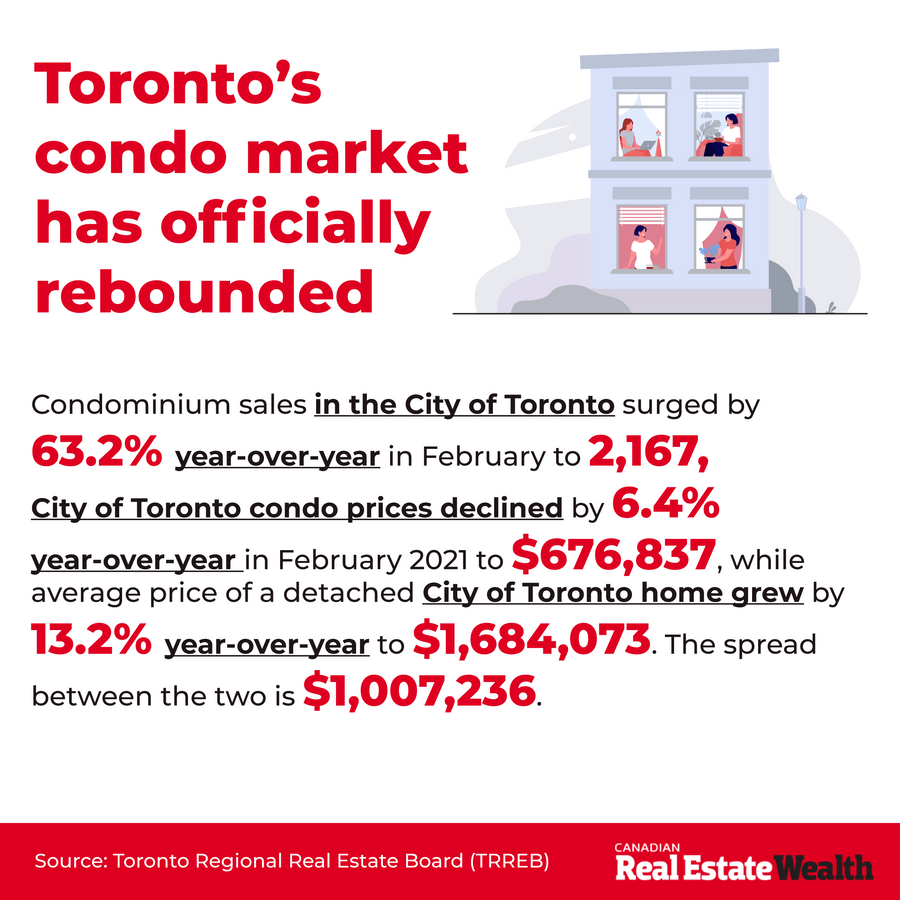Toronto’s condo market was down in 2020, but as it’s proving in early 2021, it’s not out.
Condominium sales in the City of Toronto surged by 63.2% year-over-year in February to 2,167, according to the latest data from the Toronto Regional Real Estate Board, despite prices declining by 6.4% to $676,837—remember, February 2020 was the month before the COVID-19 pandemic struck and —indicating that last year’s market nadir was an aberration.
The likeliest explanation for the sudden renewal of buyer interest in Toronto proper condominiums is the spread between low- and high-rise homes has grown too wide. In fact, that may be an understatement considering the average price of a detached City of Toronto home grew by 13.2% year-over-year to $1,684,073 in February, broadening the spread to $1,007,236.
“At no other point in time has the affordability gap between average low-rise and high-rise prices been this big, and historically when we see a gap this big, affordability becomes a major issue and people start looking to buy a condo or go to the 905 to find other affordable options,” said Ryan Coyle, co-founder of Connect.ca Realty in Toronto. “But what’s interesting now is we’re also seeing record affordability gaps with the 416 lagging the 905, so it’s inverse.”
This isn’t unprecedented. At the beginning of 2017, low-rise home prices were through the proverbial roof, but by the end of the year they declined by 2.8% while high-rise prices skyrocketed.

Toronto’s condo inventory has gone from about a half-year’s worth earlier in the pandemic to 1.6 months, and Coyle says he’s seeing multiple offer situations in the high-rise market too.
“People leave the City of Toronto to find more affordable housing, but when housing outside of Toronto becomes too expensive, they go back to the city where prices start looking like deals,” he said.
An noted that sales activity in Canada’s downtown condo submarkets, which languished in the pandemic’s wake, has picked up considerably in recent months, further elucidating that the market rebound has, indeed, occurred.
“Yes, I see people coming back to downtown condo markets. We’re already seeing it happen here in Vancouver as well,” said Dustan Woodhouse, president of Mortgage Architects. “The spread between detached and high-rise grows so wide, and so quickly, that people suddenly start saying, ‘Hang on, these condos look a whole lot sharper, as far as deals go.’ Rents haven’t taken a significant hit in Vancouver.
“Logically, it follows that, as townhouses and detached homes grow in price and condos lag, investors look at condos. And will condo prices move and catch up? Yes.”
Neil Sharma is the Editor-In-Chief of Canadian Real Estate Wealth and Real Estate Professional. As a journalist, he has covered Canada’s housing market for the Toronto Star, Toronto Sun, National Post, and other publications, specializing in everything from market trends to mortgage and investment advice. He can be reached at neil@crewmedia.ca.









